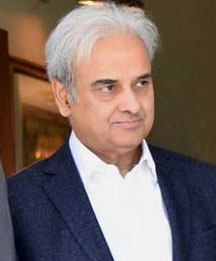ISLAMABAD, (Reuters) – Pakistan yesterday appointed former chief justice Nasir-Ul-Mulk as caretaker prime minister until a general election on July 25 which is expected to usher in the second-ever democratic transition in the nuclear armed nation of 208 million people.
The interim administration does not usually make any major decisions until the new government is elected, though it may be forced to act to shore up the economy amid a worsening macro-economic outlook.
Monday’s appointment, announced by premier Shahid Khaqan Abbasi, comes amid growing political and economic instability, and ends weeks of wrangling between Abbasi’s ruling Pakistan Muslim League-Nawaz (PML-N) party and the opposition.
“No Pakistani can lift a finger (against) such a name,” Abbasi told reporters, seated next to Syed Khurshid Ahmed Shah, who led talks for the opposition Pakistan People’s Party (PPP).
Unlike the run-ups to the previous two elections, which were marred by frequent attacks by Islamist militants, Pakistan has seen a sharp decline in militancy over the past few years.
But allegations of interference by the powerful, coup-prone military are rife ahead of the election, with the PML-N accusing the military of trying to weaken it.
The military, which has ruled Pakistan for about half its history since independence in 1947, denies meddling in politics.
Mulk, who also served as the interim chief of the Election Commission of Pakistan, will head a technocratic government after the current government and parliament are dissolved on Thursday.
Issues Mulk and his team will have to contend with, though briefly, range from international isolation and strained ties with the United States to nursing the economy which is increasingly relying on Chinese loans to stay afloat.
While Abbasi was effusive in his praise of Mulk, the PML-N’s efforts to drag out the talks on who should be caretaker leader signalled to voters its concern about interference in the election, according to Aamer Ahmed Khan, a Pakistani journalist and analyst.
The main challenge to the PML-N, which has been weakened since the Supreme Court ousted its founder, Nawaz Sharif, is expected to come from the Pakistan Tehrik-e-Insaf, or Justice Party, headed by cricketer-turned-politician Imran Khan.
Khan, who has risen to prominence on an anti-graft agenda, has promised to clean up government in his first 100 days in office and build “world-class” schools and hospitals.
Khan welcomed Mulk’s appointment, as did the right-leaning religious Jamat-e-Islami party.
Nevertheless, Mulk was a surprise choice for the role.
The PPP’s Shah saying the former judge was not the frontrunner when the ruling party and the opposition began discussing the six likely candidates.
Mulk “enjoys a good reputation” in the wider political arena, said Raza Ahmad Rumi, the editor of the English-language Daily Times.
“He’s seen as a neutral judge in the past without any political affiliation,” Rumi said.
“It’s a good development.”
But Rumi warned the Election Commission may have an even bigger role than normal to play in the run-up to the election, and had not been properly reformed.
The Supreme Court Bar Association’s president, Kamran Murtaza, said Mulk had stood up against then army chief, General Pervez Musharraf, when he staged a coup in 1999, refusing to take an oath while the constitution was suspended.
Mulk later opposed Musharraf when he imposed an emergency in 2007.
“He would never compromise on principles,” said Murtaza.

